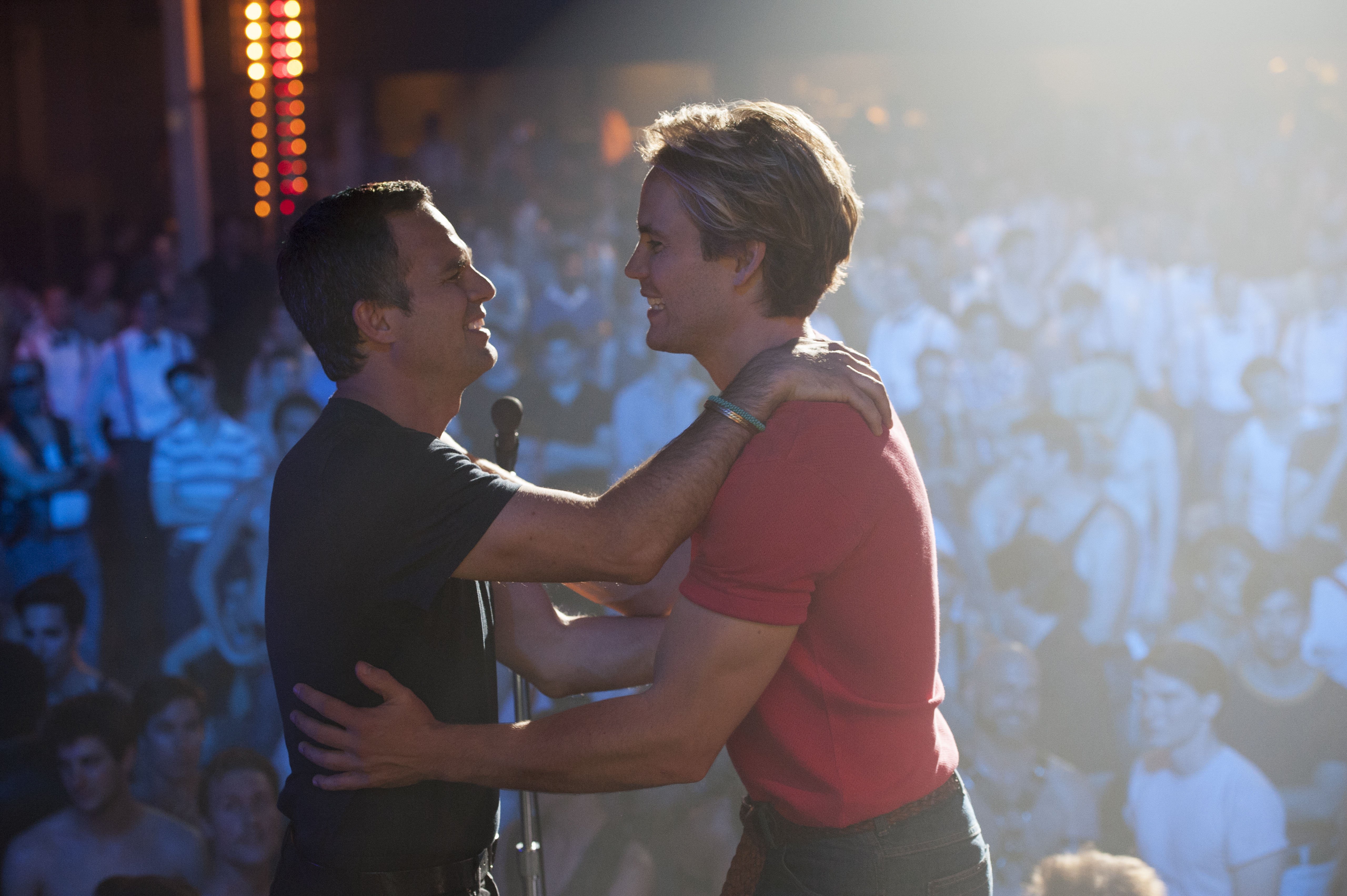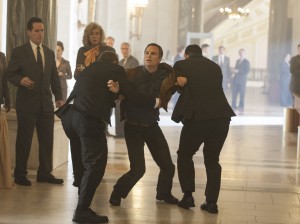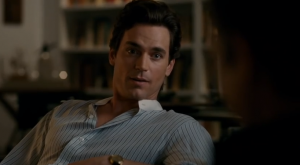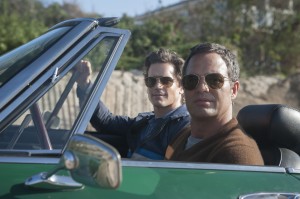‘The Normal Heart’: Why it’s a must-see film for gay men
By Ben Kelly

begins with a prelude that wasn’t in the original play. In the summer of 1981, the gay community of New York are at play on the haven of Fire Island, with sex, drugs and Donna Summer. They are sitting on a time bomb. There’s no great concern when Jonathan Groff’s character collapses – he gets back up again. But after the credits roll, the bright colours of summer become the darker tones of a colder season that sets in and doesn’t go away. Groff is seen fitting, bleeding and foaming at the mouth. Just like that, he’s dead. A gay cancer is spreading, and for most the first symptoms are purplish lesions, which become markers of the men who will inevitably waste away and die. With no clue as to what it is, what’s causing it, what’s spreading it, or who already has it, the hindsight knowledge of the viewer makes this a deeply frustrating watch.
Mark Ruffalo shines in the lead role of Ned Weeks (Larry Kramer’s barely veiled version of himself) – an overeducated, thoroughly Jewish and enraged writer who combats the silence around the disease with his own brand of accusatory vocalism. You sympathise with him time and again, as he is refused financial help from his own brother and laughed at by the gay community when he begs them to stop having sex; when he is dragged away from an ignoring (and possibly closeted) Mayor, screaming “We’re dying!”, and when he is lambasted on television for accusing the American government of letting gay men be wiped out, by ignoring the crisis. His tactics eventually lead to his dismissal from the activist group he helped to found, who mistake his style for “a colossal ego trip”; something many of them dare not match because they still cannot be openly gay in their jobs as journalists, bankers and lawyers: this is 1984.
 One does question how unbiased Kramer’s account of his own story can really be, in what is essentially a roman a clef with only the names changed; but he doesn’t make stress to paint a likeable version of himself. At times even the viewers will feel he should have been more negotiable in individual instances, despite the overwhelming need for outrage. Repeatedly, he cuts his nose off to spite his face, when progress isn’t happening fast enough – or indeed, at all. Although he could have presented himself as a hero, his plight is shared with Dr. Emma Brookner (Julia Roberts), who for seemingly years is the only doctor who will treat patients, and attempt to understand the disease. Within the medical world, she too faces only denial, disbelief, silence and prejudice. Those two aside, with a line here or a cut away there, Kramer’s script and Ryan Murphy’s direction imply that the true heroes are all the gay men who experienced AIDS in its darkest days; whether they lived, or died.
One does question how unbiased Kramer’s account of his own story can really be, in what is essentially a roman a clef with only the names changed; but he doesn’t make stress to paint a likeable version of himself. At times even the viewers will feel he should have been more negotiable in individual instances, despite the overwhelming need for outrage. Repeatedly, he cuts his nose off to spite his face, when progress isn’t happening fast enough – or indeed, at all. Although he could have presented himself as a hero, his plight is shared with Dr. Emma Brookner (Julia Roberts), who for seemingly years is the only doctor who will treat patients, and attempt to understand the disease. Within the medical world, she too faces only denial, disbelief, silence and prejudice. Those two aside, with a line here or a cut away there, Kramer’s script and Ryan Murphy’s direction imply that the true heroes are all the gay men who experienced AIDS in its darkest days; whether they lived, or died.
The film sports a strong, complementary cast, without reliance on any one or two runaway stars. Matt Bomer lost 40 pounds to play Ned’s boyfriend Felix, as he progresses from a gorgeous young reporter to a skeletal shell on his deathbed. Jim Parsons, playing secretary Tommy Boatwright plays a stoic survivor, who is seen time and again taking phone calls notifying him of deaths, to which he responds by adding their contact cards to an ever growing pile. By the final call, he is numb to the process, but still cries heartily at another human loss.
There’s no denying that this is a devastatingly sad film. It’s two hours of intense drama with no relief, and it can be painfully tough viewing. In one scene, the health group’s president Bruce (action hero heartthrob Taylor Kitsch) confides the story of how he took his dying boyfriend on a flight back to Denver to be with his mother. A pilot refuses to fly with the patient on board, and when they do set off, he slips into a delirious fit, and vomits in his seat – by the time they reach their destination, he has died. Hospital workers refuse to touch the body, and wrap him in bin liners, before leaving him next to the garbage, where his lover and mother must collect the body.
 To top it all off, there is no happy ending here. When Larry Kramer wrote The Normal Heart in 1985 he was utterly dejected and hopeless, with every right to believe the entire gay population was on course to be wiped out, with the world not caring. Although there is technically still no happy ending by way of eradication of the disease, the way in which HIV/AIDS is understood, treated and (crucially) survived, is the light at the end of the tunnel. Arguably, there’s no tale in gay history more important to pass on to future generations than that of the early days of the AIDS epidemic. It is a story of how perseverance was tested, and our very existence threatened; of how prejudice thrived and yet love survived.
To top it all off, there is no happy ending here. When Larry Kramer wrote The Normal Heart in 1985 he was utterly dejected and hopeless, with every right to believe the entire gay population was on course to be wiped out, with the world not caring. Although there is technically still no happy ending by way of eradication of the disease, the way in which HIV/AIDS is understood, treated and (crucially) survived, is the light at the end of the tunnel. Arguably, there’s no tale in gay history more important to pass on to future generations than that of the early days of the AIDS epidemic. It is a story of how perseverance was tested, and our very existence threatened; of how prejudice thrived and yet love survived.
The Normal Heart is a must-see film for gay men across the world who can boast freedom, equality and health because of the battles fought in their name; but it’s also an inspirational reminder of just how loud a call to arms can be, for the people still engaged in the battle. In a scene towards the end of the film, whilst delivering a eulogy, Jim Parsons’ character laments the loss of a generation of artists, and “all those plays that won’t get written now”. Thankfully, this one was.
Rating: 5/5
The Normal Heart premieres in the UK on Sky Atlantic tomorrow (June 1) at 8pm.
Read what other critics are saying about The Normal Heart here
Read star Jim Parsons’ latest comments about the importance of The Normal Heart

